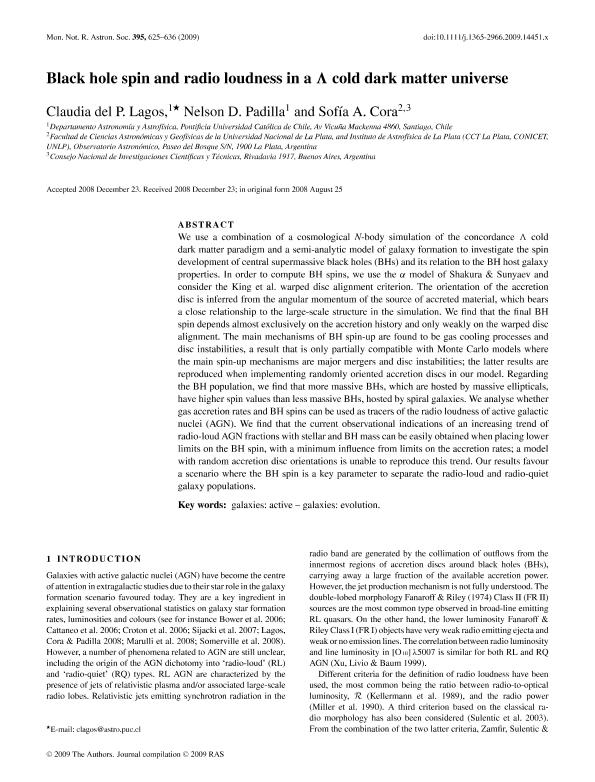Mostrar el registro sencillo del ítem
dc.contributor.author
Lagos Urbina, Claudia del Pilar

dc.contributor.author
Padilla, Nelson David

dc.contributor.author
Cora, Sofia Alejandra

dc.date.available
2018-04-20T14:08:38Z
dc.date.issued
2009-12
dc.identifier.citation
Lagos Urbina, Claudia del Pilar; Padilla, Nelson David; Cora, Sofia Alejandra; Black hole spin and radio loudness in a LCDM universe; Wiley Blackwell Publishing, Inc; Monthly Notices of the Royal Astronomical Society; 395; 12-2009; 625-636
dc.identifier.issn
0035-8711
dc.identifier.uri
http://hdl.handle.net/11336/42804
dc.description.abstract
We use a combination of a cosmological N-body simulation of the concordance cold dark matter paradigm and a semi-analytic model of galaxy formation to investigate the spin development of central supermassive black holes (BHs) and its relation to the BH host galaxy properties. In order to compute BH spins, we use the α model of Shakura & Sunyaev and consider the King et al. warped disc alignment criterion. The orientation of the accretion disc is inferred from the angular momentum of the source of accreted material, which bears a close relationship to the large-scale structure in the simulation. We find that the final BH spin depends almost exclusively on the accretion history and only weakly on the warped disc alignment. The main mechanisms of BH spin-up are found to be gas cooling processes and disc instabilities, a result that is only partially compatible with Monte Carlo models where the main spin-up mechanisms are major mergers and disc instabilities; the latter results are reproduced when implementing randomly oriented accretion discs in our model. Regarding the BH population, we find that more massive BHs, which are hosted by massive ellipticals, have higher spin values than less massive BHs, hosted by spiral galaxies. We analyse whether gas accretion rates and BH spins can be used as tracers of the radio loudness of active galactic nuclei (AGN). We find that the current observational indications of an increasing trend of radio-loud AGN fractions with stellar and BH mass can be easily obtained when placing lower limits on the BH spin, with a minimum influence from limits on the accretion rates; a model with random accretion disc orientations is unable to reproduce this trend. Our results favour a scenario where the BH spin is a key parameter to separate the radio-loud and radio-quiet galaxy populations.
dc.format
application/pdf
dc.language.iso
eng
dc.publisher
Wiley Blackwell Publishing, Inc

dc.rights
info:eu-repo/semantics/openAccess
dc.rights.uri
https://creativecommons.org/licenses/by-nc-sa/2.5/ar/
dc.subject
Galaxies
dc.subject
Evolution of Galaxies
dc.subject
Formation of Galaxies
dc.subject
Active Galaxies
dc.subject.classification
Astronomía

dc.subject.classification
Ciencias Físicas

dc.subject.classification
CIENCIAS NATURALES Y EXACTAS

dc.title
Black hole spin and radio loudness in a LCDM universe
dc.type
info:eu-repo/semantics/article
dc.type
info:ar-repo/semantics/artículo
dc.type
info:eu-repo/semantics/publishedVersion
dc.date.updated
2018-04-19T18:31:30Z
dc.journal.volume
395
dc.journal.pagination
625-636
dc.journal.pais
Reino Unido

dc.journal.ciudad
Londres
dc.description.fil
Fil: Lagos Urbina, Claudia del Pilar. Pontificia Universidad Católica de Chile; Chile
dc.description.fil
Fil: Padilla, Nelson David. Pontificia Universidad Católica de Chile; Chile
dc.description.fil
Fil: Cora, Sofia Alejandra. Consejo Nacional de Investigaciones Científicas y Técnicas. Centro Científico Tecnológico Conicet - La Plata. Instituto de Astrofísica La Plata. Universidad Nacional de La Plata. Facultad de Ciencias Astronómicas y Geofísicas. Instituto de Astrofísica La Plata; Argentina
dc.journal.title
Monthly Notices of the Royal Astronomical Society

dc.relation.alternativeid
info:eu-repo/semantics/altIdentifier/doi/http://dx.doi.org/10.1111/j.1365-2966.2009.14451.x
dc.relation.alternativeid
info:eu-repo/semantics/altIdentifier/url/https://academic.oup.com/mnras/article/395/2/625/993484
Archivos asociados
